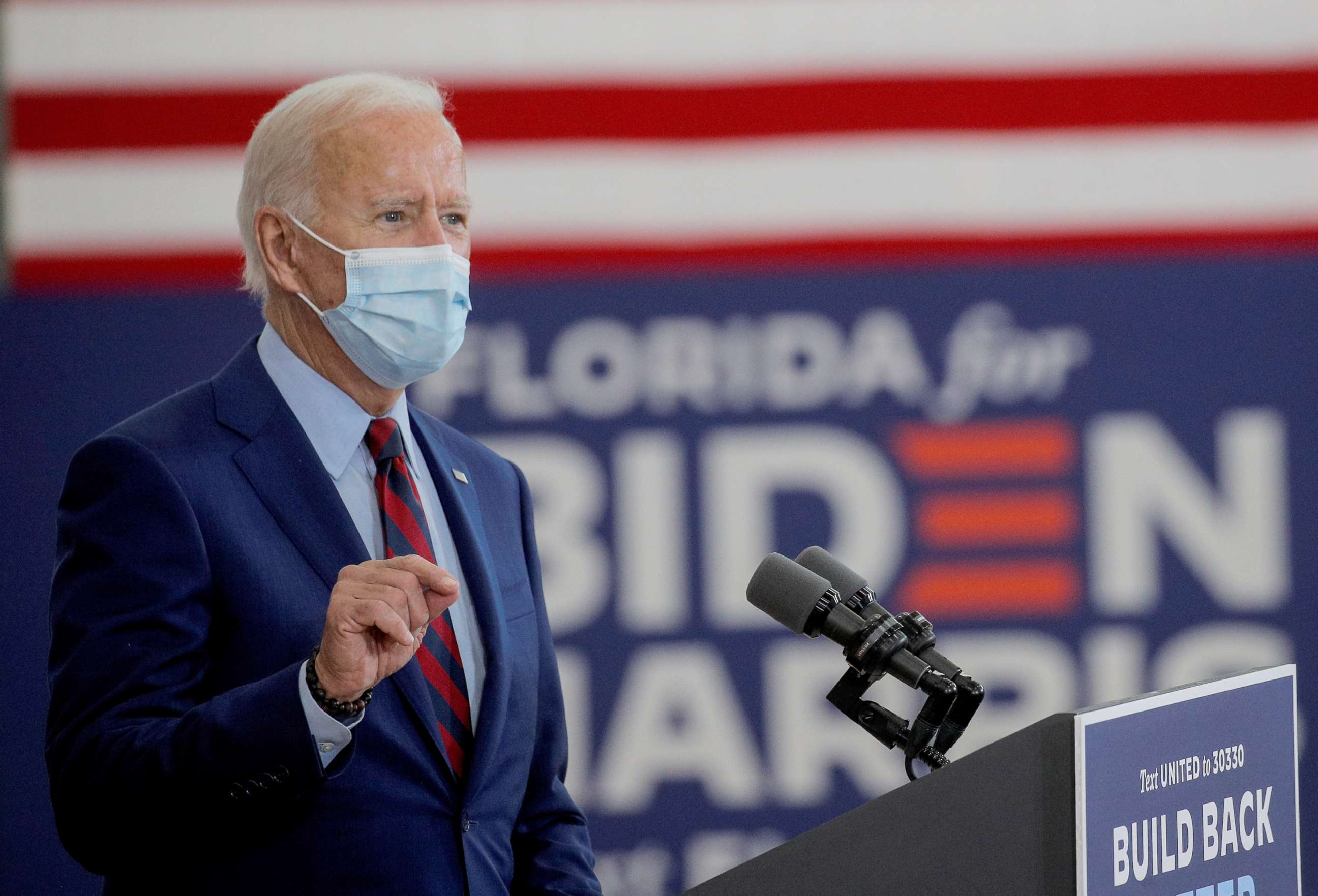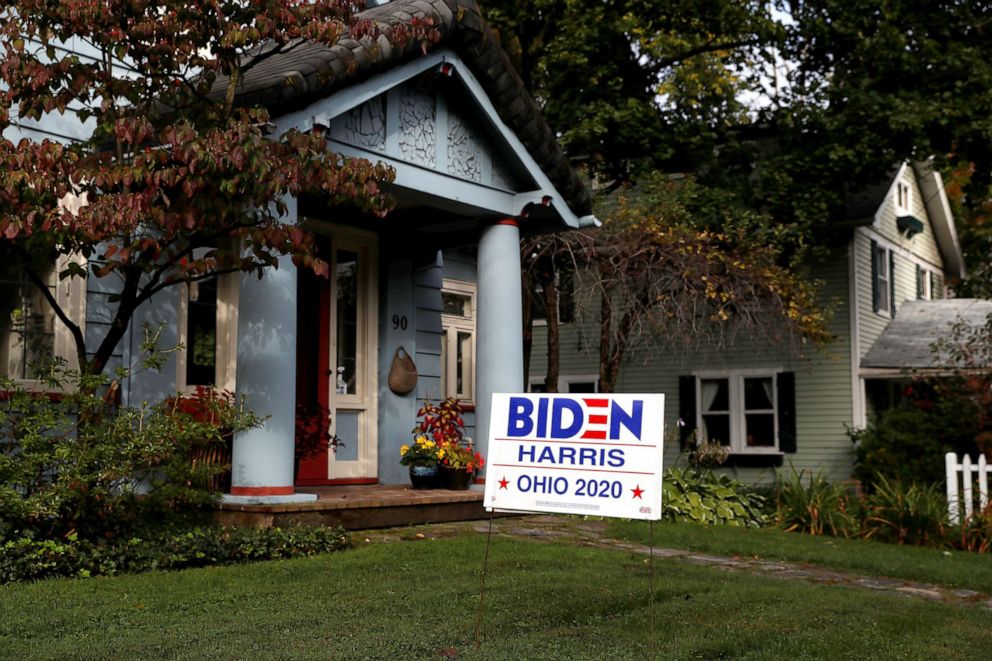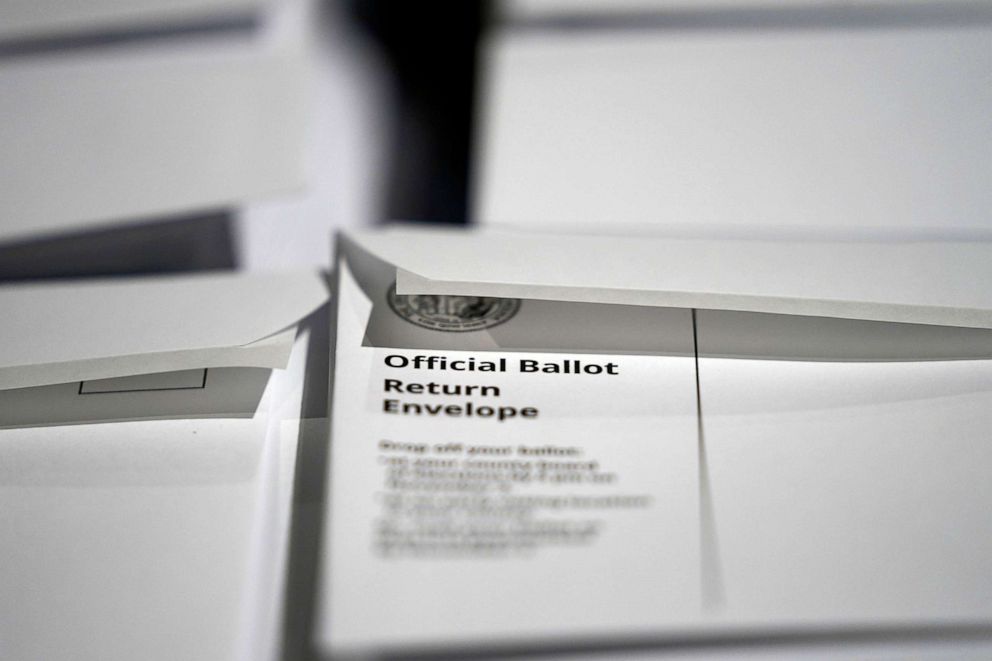The Note: Biden sees masks as symbol and substance in drawing contrast with Trump
Biden is calling out Trump, pleading for science over showmanship
The TAKE with Rick Klein
Less than a week ago, President Donald Trump stood on the debate stage and mocked his rival for wearing a mask.
Trump wore a mask Monday in leaving Walter Reed for the White House -- but it didn't stay on long. By the end of another extraordinary night, with an infected president urging people not to let COVID-19 "dominate" their lives, it may as well have never been on.
Former Vice President Joe Biden is calling that out, as he pleads for science over showmanship with a month to go before Election Day.
"Anybody who contracts the virus by essentially saying masks don't matter, social distancing doesn't matter, I think is responsible for what happens to them," Biden said in Monday night's NBC town hall. "What is this macho thing -- 'I'm not going to wear a mask?' What's the deal here? Big deal!"

Masks have been a big deal in this campaign because the president has made them so. Notwithstanding his own administration's guidelines, Trump used masks as a political cudgel long before the stunning irresponsibility inside his White House and campaign appears to have contributed to the spread COVID-19 among the president and his inner circle.
Trump's moves now are as incredible as they are predictable. Monday night he said in a video he tweeted out that now he might be "immune" from COVID-19, as he again promised a vaccine and treatments.
"Don't let it dominate. Don't let it take over your lives. Don't let that happen," the president said.
The virus, though, has already thoroughly dominated the national discussion as well as the campaign. Polls have consistently shown mistrust and worse for the president's handling of the pandemic.
Trump's showmanship, even if this moment, has been something to behold. But it's hard to see how he is expanding his vote share through his actions -- which is just fine with Biden, of course.
The RUNDOWN with Benjamin Siegel
Ohio and New Mexico on Tuesday join the growing list of 43 states and territories where Americans have already started casting their votes for the 2020 election.
Voters in the Buckeye State can begin voting in person or dropping off absentee ballots Tuesday morning in 88 early voting locations -- one for every county. More than 2 million Ohioans have requested absentee ballots – putting the state on track to double the number of ballots cast absentee compared to 2016, when Trump won the state.
So far, at least 3.8 million ballots have been cast nationwide in the election reshaped by the coronavirus pandemic, according to University of Florida political scientist Michael McDonald.
The early voting window in Ohio, which ends the Monday before the election, opens as Democrats and Republicans in the state continue to spar over the number of absentee ballot drop boxes available to voters as an alternative to returning ballots through the Postal Service.

On Monday, Secretary of State Frank LaRose, a Republican, announced that he would allow county election officials to set up more than one drop box in each county -- but only on the property of each county's board of elections office.
"Despite predictable partisan politics that attempt to create phony crises, we have kept our eye on the ball and Ohio's election officials are ready to administer a safe, secure and accurate election," he said in a statement.
The new guidance -- which followed a judge's ruling that Ohio law allowed but didn't require LaRose establish more than one drop box in each county -- was met by criticism from Democrats and voting rights groups, who have criticized LaRose for not doing more to expand access to drop boxes across each county.
"Frank LaRose pledged publicly that he would allow expanded dropbox locations if he were allowed under Ohio law. We proved our case, and he lost, showing that dropboxes are permitted in multiple locations in Ohio counties. Now he's going back on his word with a transparent, cynical ploy," Ohio Democratic Party Chairman David Pepper said in a statement.
A federal judge could still rule on the matter following the state court's decision -- as a similar legal fight takes shape in Texas over Republican Gov. Greg Abbott's decision to limit the number of ballot drop-off sites.
The TIP with Tonya Simpson
With four weeks until Election Day, the North Carolina State Board of Elections has no clear plan for fixing errors on thousands of mail-in ballots.
As of Oct. 4., 7,272 returned absentee ballots are classified as "pending cure." That means there is missing information on the ballot or envelope.
North Carolina State Board of Elections Executive Director Karen Brinson-Bell on Sunday sent a memo to local boards directing them to "take no action" on ballots that come in with mistakes. Brinson-Bell said the decision is to avoid confusion while matters are pending in several courts. "Envelopes with deficiencies shall be kept in a secure location and shall not be considered by the county board until future notice," according to the memo.

A county judge approved changes to the ballot curing process last Friday. The next day a federal judge issued a restraining order banning the NCSBE from enacting the changes. The proposed changes would allow voters who are missing witness signatures or addresses on their envelope to correct them by filling out an affidavit instead of completing a new ballot. The federal order blocking the changes came after North Carolina Republicans joined the Trump campaign and the Republican National Committee in filing lawsuits to block the new rules.
Here's a state-by-state guide to voting in the age of COVID-19.
THE PLAYLIST
ABC News' "Start Here" podcast. Tuesday morning's episode features ABC News Chief White House correspondent Jonathan Karl and ABC News Chief Medical correspondent Dr. Jennifer Ashton -- the two discuss President Donald Trump's return to the White House and the plan for his care going forward. ABC News Senior Congressional correspondent Mary Bruce explains how the White House COIVD-19 outbreak is impacting both Senate and campaign business. And ABC News Chief Business and Economics correspondent Rebecca Jarvis tells us how the movie theater industry has been hit especially hard during the pandemic.http://apple.co/2HPocUL
"Ten Percent Happier" podcast. In an election season characterized by misinformation, mistrust, and now a positive COVID-19 test from the president -- we've been plunged headlong into a black hole of uncertainty. So here at the Ten Percent Happier podcast, we've decided to serve up some deep counter-programming. Unlike the campaign coverage you'll get everywhere else in the universe, in this special "Election Sanity" series we won't have arguments and we won't talk polls. We're going to help you navigate all of this tumult and toxicity in a way that allows you to be both engaged and calm. https://podcasts.apple.com/us/podcast/whats-love-got-to-do-it-election-sanity-series-joanna/id1087147821?i=1000493606605
FiveThirtyEight Politics Podcast. During the four days since President Donald Trump was diagnosed with the coronavirus, the public has received limited and conflicting information about his health status. To make sense of what the limited information we do have might mean, the FiveThirtyEight Politics podcast crew spoke with emergency room Dr. Craig Spencer about Trump's prognosis and his ability to get back to work and campaigning. They also spoke with presidential scholar Lara Brown about how past presidential illnesses have been addressed.https://apple.co/23r5y7w
WHAT YOU NEED TO KNOW TODAY
Download the ABC News app and select "The Note" as an item of interest to receive the day's sharpest political analysis.
The Note is a daily ABC News feature that highlights the day's top stories in politics. Please check back tomorrow for the latest.




